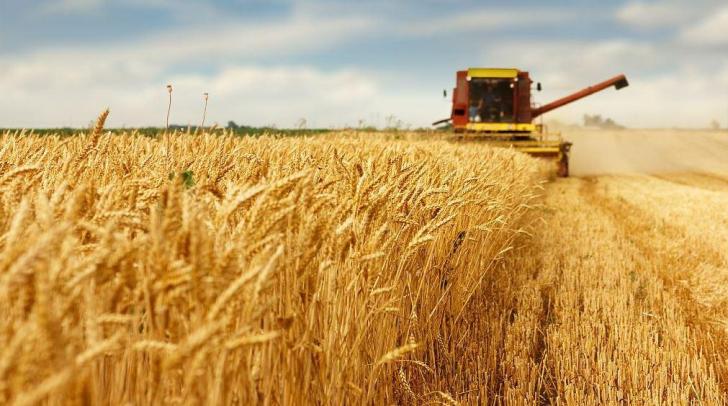News / National
Zimbabwe achieves record wheat harvest
24 Nov 2024 at 09:59hrs |
0 Views

Zimbabwe has achieved a record-breaking wheat harvest of over 560,000 tonnes for the 2024 season, surpassing last year's production of 467,905 tonnes. This marks the second consecutive year the country has set a new winter wheat output record, solidifying its status as one of the few African nations, alongside Ethiopia, to attain wheat self-sufficiency.
The country's annual wheat demand stands at 360,000 tonnes, meaning this year's surplus could open avenues for exports and generate much-needed foreign currency. The milestone also strengthens Zimbabwe's ambitions to reclaim its breadbasket status in the region.
Harvest Highlights
Permanent Secretary in the Ministry of Lands, Agriculture, Fisheries, Water and Rural Development, Professor Obert Jiri, confirmed the completion of the wheat harvest.
"The actual harvesting is now complete," said Prof. Jiri.
He noted that official figures would be announced soon by Minister of Agriculture Dr. Anxious Masuka during a Cabinet briefing.
While Zimbabwe missed its target of 600,000 tonnes, surpassing the half-million mark remains a significant achievement.
Chief Director for Agricultural Engineering in the same ministry, Engineer Edwin Zimunga, praised the collaborative efforts of farmers and government initiatives:
"We can safely say setting new records has become part of our DNA. Government's investment in wheat production continues to pay off handsomely, as farmers have successfully increased output."
Mechanisation and Support
The record harvest was bolstered by extensive mechanisation efforts, with over 14,000 tractors and at least 300 combine harvesters deployed through 22 mechanisation hubs nationwide. This infrastructure played a critical role in achieving high yields.
Engineer Zimunga added, "Farmers really answered the Government's call to fight for food security. It is clear that the initiatives are yielding results."
Impact on Consumers and Economy
The bumper harvest is expected to stabilise the prices of wheat-based products such as bread, pasta, and pastries, bringing relief to consumers.
Consumer Council of Zimbabwe (CCZ) Chief Executive Officer Mrs. Rosemary Mpofu said:
"The bumper wheat harvest brings hope for good and stable prices. Excess wheat can be exported, generating vital foreign currency to boost our economy."
Similarly, Confederation of Zimbabwe Retailers (CZR) President Denford Mutashu urged businesses to ensure pricing stability and compliance with national economic policies.
"We cannot have products priced high due to speculative sentiments," Mutashu said.
Reclaiming the Breadbasket Title
Between 1969 and 1999, Zimbabwe averaged wheat production of 250,000 tonnes annually, peaking at 325,000 tonnes in 1990. The recent surge in output positions the nation closer to reclaiming its historic breadbasket title in the Southern African region.
With a combination of supportive policies, mechanisation, and farmer resilience, Zimbabwe is proving its agricultural sector can drive national food security and economic growth.
The country's annual wheat demand stands at 360,000 tonnes, meaning this year's surplus could open avenues for exports and generate much-needed foreign currency. The milestone also strengthens Zimbabwe's ambitions to reclaim its breadbasket status in the region.
Harvest Highlights
Permanent Secretary in the Ministry of Lands, Agriculture, Fisheries, Water and Rural Development, Professor Obert Jiri, confirmed the completion of the wheat harvest.
"The actual harvesting is now complete," said Prof. Jiri.
He noted that official figures would be announced soon by Minister of Agriculture Dr. Anxious Masuka during a Cabinet briefing.
While Zimbabwe missed its target of 600,000 tonnes, surpassing the half-million mark remains a significant achievement.
Chief Director for Agricultural Engineering in the same ministry, Engineer Edwin Zimunga, praised the collaborative efforts of farmers and government initiatives:
"We can safely say setting new records has become part of our DNA. Government's investment in wheat production continues to pay off handsomely, as farmers have successfully increased output."
Mechanisation and Support
The record harvest was bolstered by extensive mechanisation efforts, with over 14,000 tractors and at least 300 combine harvesters deployed through 22 mechanisation hubs nationwide. This infrastructure played a critical role in achieving high yields.
Engineer Zimunga added, "Farmers really answered the Government's call to fight for food security. It is clear that the initiatives are yielding results."
Impact on Consumers and Economy
The bumper harvest is expected to stabilise the prices of wheat-based products such as bread, pasta, and pastries, bringing relief to consumers.
Consumer Council of Zimbabwe (CCZ) Chief Executive Officer Mrs. Rosemary Mpofu said:
"The bumper wheat harvest brings hope for good and stable prices. Excess wheat can be exported, generating vital foreign currency to boost our economy."
Similarly, Confederation of Zimbabwe Retailers (CZR) President Denford Mutashu urged businesses to ensure pricing stability and compliance with national economic policies.
"We cannot have products priced high due to speculative sentiments," Mutashu said.
Reclaiming the Breadbasket Title
Between 1969 and 1999, Zimbabwe averaged wheat production of 250,000 tonnes annually, peaking at 325,000 tonnes in 1990. The recent surge in output positions the nation closer to reclaiming its historic breadbasket title in the Southern African region.
With a combination of supportive policies, mechanisation, and farmer resilience, Zimbabwe is proving its agricultural sector can drive national food security and economic growth.
Source - Sunday Mail
Join the discussion
Loading comments…






























